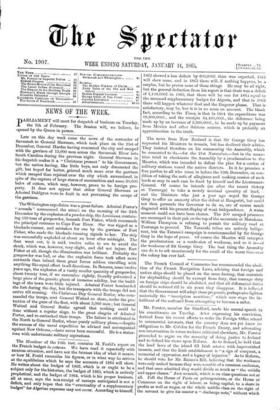The news from New Zealand is that Sir George Grey
has requested his Ministers to remain, but has declined their advice. They insisted therefore on his summoning the Assembly, which he consented to do,—for the 21st November,—but in the mean- time tried to checkmate the Assembly by a proclamation to the Maories, which was intended to defeat the plan for a cordon of military stations round the native districts. In it he promises a free pardon to all who come in before the 10th December, on con- dition of taking the oath of allegiance and making cession of such lands as may in each case be fixed by himself and the Lieutenant. General. Of course he intends (as after the recent victory at Tauranga) to take a merely nominal quantity of land, - - and the Ministers who just a year ago urged Sir George Grey to offer an amnesty after the defeat at Rangariri, but could not then persuade the Governor to do so, are of course much disgusted with his present display of weak independence. A worse moment could not have been chosen. The 200 escaped prisoners are encamped in their pah on the top of the mountain at Matakona. William Thompson is refusing to permit the military road at Tauranga to proceed. The Taranaki tribes are actively bellige- rent, but the Taranaki campaign is countermanded by Sir George Grey in the hope of peace. Of course the Maories will interpret the proclamation as a confe:sion of weakness, and so it is—of the weakness of Sir George Grey. The best thing the Assembly can do is to ask unanimously for the recall of the worst Governor the colony has ever had.






























